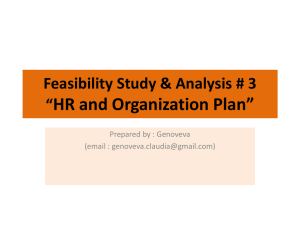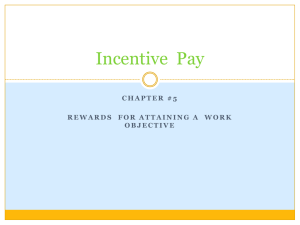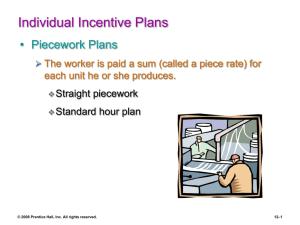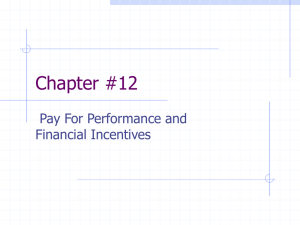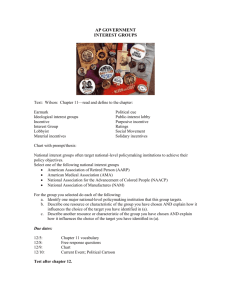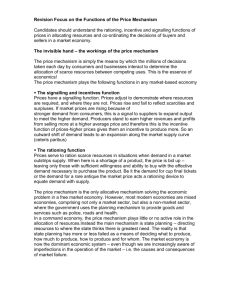Human Resource Management 11e.
advertisement
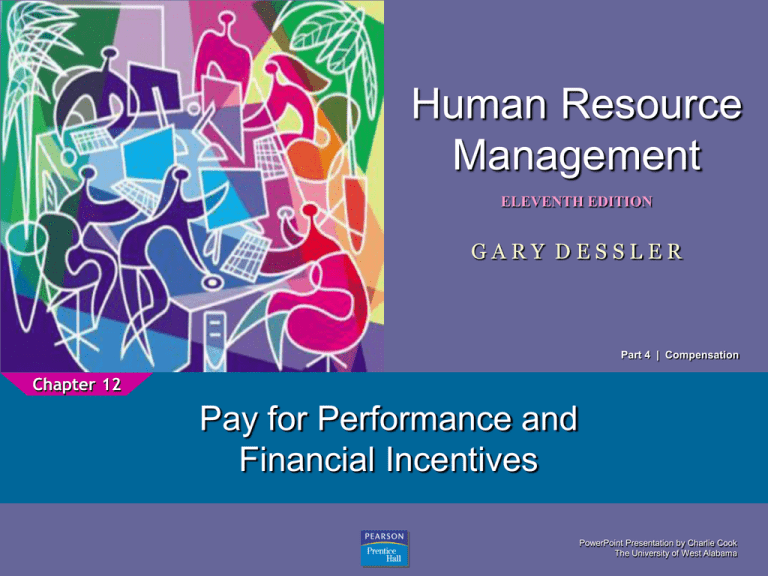
Human Resource Management 1 ELEVENTH EDITION GARY DESSLER Part 4 | Compensation Chapter 12 Pay for Performance and Financial Incentives PowerPoint Presentation by Charlie Cook The University of West Alabama After studying this chapter, you should be able to: 1. Discuss the main incentives for individual employees. 2. Discuss the pros and cons of incentives for salespeople. 3. Name and define the most popular organizationwide variable pay plans. 4. Describe the main incentives for managers and executives. 5. Outline the steps in developing effective incentive plans. Motivation, Performance, and Pay • Incentives Financial rewards paid to workers whose production exceeds a predetermined standard. • Frederick Taylor Popularized scientific management and the use of financial incentives in the late 1800s. Systematic Fair soldiering day’s work Employee Incentive Plans Individual Employee Incentive and Recognition Programs Sales Compensation Programs Pay-for-Performance Plans Team/Group-based Variable Pay Programs Organizationwide Incentive Programs Executive Incentive Compensation Programs Incentives for Salespeople • Salary Plan Straight salaries Best for: prospecting (finding new clients), account servicing, training customer’s salesforce, or participating in national and local trade shows. • Commission Plan Pay is a percentage of sales results. Keeps sales costs proportionate to sales revenues. May cause a neglect of nonselling duties. Can create wide variation in salesperson’s income. Likelihood of sales success may be linked to external factors rather than to salesperson’s performance. Can increase turnover of salespeople. Incentives for Salespeople (cont’d) • Combination Plan Pay is a combination of salary and commissions, usually with a sizable salary component. Plan gives salespeople a floor (safety net) to their earnings. Salary component covers company-specified service activities. Plans tend to become complicated, and misunderstandings can result. Specialized Combination Plans • Commission-plus-Drawing-Account Plan Commissions are paid but a draw on future earnings helps the salesperson to get through low sales periods. • Commission-plus-Bonus Plan Pay is mostly based on commissions. Small bonuses are paid for directed activities like selling slow-moving items. Team/Group Incentive Plans • Team (or Group) Incentive Plans Incentives are based on team’s performance. • How to Design Team Incentives Set individual work standards. Set work standards for each team member and then calculate each member’s output. Members are paid based on one of three formulas: All receive the same pay earned by the highest producer. All receive the same pay earned by the lowest producer. All receive the same pay equal to the average pay earned by the group. Team/Group Incentive Plans (cont’d) • Pros Reinforces team planning and problem solving Helps ensure collaboration Encourages a sense of cooperation Encourages rapid training of new members • Cons Pay is not proportionate to an individual’s effort Rewards “free riders” Organizationwide Incentive Plans • Employee Stock Ownership Plan (ESOP) A firm annually contributes its own stock—or cash (with a limit of 15% of compensation) to be used to purchase the stock—to a trust established for the employees. The trust holds the stock in individual employee accounts and distributes it to employees upon separation from the firm if the employee has worked long enough to earn ownership of the stock. Gainsharing Plans Scanlon Plan Philosophy of Cooperation Identity Competence Involvement System Sharing of Benefits Formula At-Risk Variable Pay Plans • Put some portion of the employee’s weekly pay at risk. If employees meet or exceed their goals, they earn incentives. If they fail to meet their goals, they forgo some of the pay they would normally have earned. Incentives for Managers and Executives • Short-Term Incentives: The Annual Bonus Plans that are designed to motivate short-term performance of managers and are tied to company profitability. • Issues in Awarding Bonuses Eligibility basis Fund size basis Individual awards KEY TERMS financial incentives fair day’s work scientific management expectancy instrumentality valence behavior modification variable pay piecework straight piecework standard hour plan merit pay (merit raise) team or group incentive plan organization wide incentive plans profit-sharing plan employee stock ownership plan (ESOP) Scanlon plan gainsharing plan at-risk variable pay plans annual bonus stock option golden parachutes
